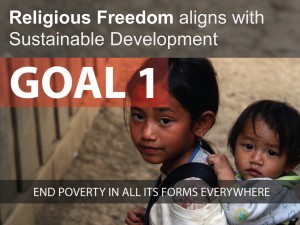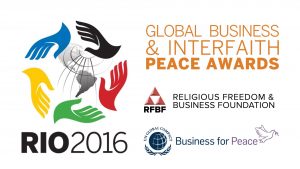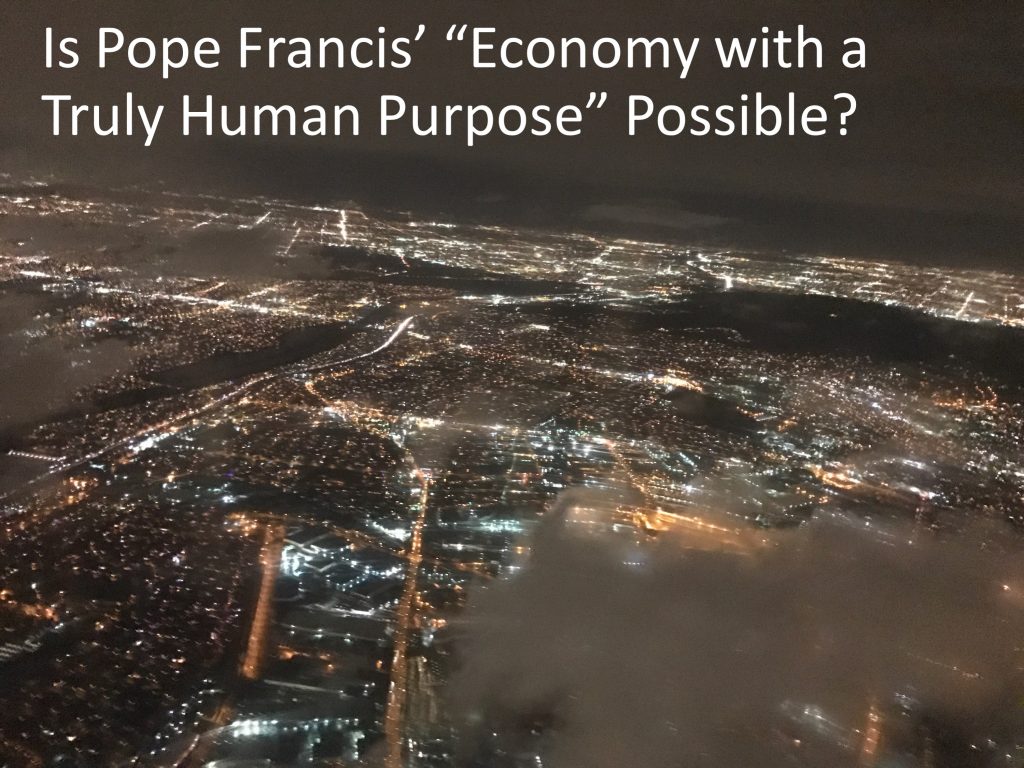Yes, for at least three reasons:
(1) Religious freedom, when protected and practiced, sets people free to act and innovate motivated by their highest ideals.
Perhaps one of the best examples is the way religious freedom sets groups and individuals free to tackle poverty.
Poverty, some argue, can only be effectively tackled by governments enforcing top-down, big-P Poverty reduction policies and programs. But a host of religious groups haven’t gotten the memo. Innovative faith-based initiatives worldwide are tackling poverty using bottom-up, small-p poverty alleviation approaches that empower individuals to be resourceful, resilient and self-reliant.
 Indeed, a central aspect of religious freedom is that it gives faith groups license to innovate and contribute to the wellbeing of individuals, communities and nations. But where religious freedom is curtailed, so are such innovations. For instance, reform-minded Saudi princess Basmah bint Saud argues, religion “should not be a shield behind which we hide from the world but a driving force that inspires us to innovate and contribute to our surroundings.”
Indeed, a central aspect of religious freedom is that it gives faith groups license to innovate and contribute to the wellbeing of individuals, communities and nations. But where religious freedom is curtailed, so are such innovations. For instance, reform-minded Saudi princess Basmah bint Saud argues, religion “should not be a shield behind which we hide from the world but a driving force that inspires us to innovate and contribute to our surroundings.”
This first installment of an ongoing series on the connection between religious freedom and sustainable development describes these small-p initiatives and concludes with a case study of how one faith group is directly targeting and reducing poverty in its congregations worldwide. Such faith-based activities are facilitated by religious freedom and directly contribute to Sustainable Development Goal (SDG) 1 – Ending poverty in all its forms everywhere. (Read more)
(2) In a world where religious tensions are high, research shows that business is a powerful force for interfaith understanding and peace.
The UN Global Compact Business for Peace platform and the Religious Freedom & Business Foundation produced a resource to highlight how businesses are a powerful force supporting interfaith understanding and peace.
The resource – available here – was introduced with then UN Secretary General Ban Ki-moon during the 2014 Global Forum of the United Nations Alliance of Civilizations (UNAOC ) held in Bali, Indonesia, August 29-30. The ways businesses do this fall into four broad categories:
- · – Using Marketing Expertise to Bridge Borders: Companies can make positive contributions to peace in society by mobilizing advertising campaigns that bring people of various faiths and backgrounds together, as seen in Coke Serves Up Understanding Across Borders.
- · – Incentivizing Innovation: Because cross-cultural dialogue and cooperation is an essential part of daily work for multinational companies, one company, the BMW Group, incentivizes other organizations to create innovative approaches to interfaith understanding through an award organized in collaboration with the UN Alliance of Civilizations. Organizations that have won this award include a tour company in the Middle East, which offers new paths to build bridges and bring cultures together, as seen in Promoting Understanding Through Tourism in the Holy Lands. Another recognized intercultural innovator uses job placements agencies to help contribute to the religious diversity of workforces, as seen in Helping Muslim Youth in the Philippines.
- – Incubating and Catalyzing Social Entrepreneurship: Business can also provide common ground where religious differences give way to shared concern and enterprise. Opportunity and Entrepreneurship in Nigeria describes an approach modeled by a peace-building organization showing how supporting companies and new entrepreneurs in conflict-affected areas can reduce extremism. Petrobras Supporting Business Incubation for Afro-Brazilians similarly shows how company support for new small enterprises can have a significant impact in developing marginalized communities.
- – Supporting Workforce Diversity: When businesses are sensitive to the religious and cultural issues around them, they can not only increase employee morale and productivity, but also address unmet difficult social needs, as shown in Indonesia Businesses Open Their Doors to Faith and Action.
(3) Never underestimate the power of business leaders as entrepreneurs for good.
Seven business men and women from around the world were honored recently for their work in interfaith relations, including three Americans. All of the leaders were recognized for using their businesses to bridge cultural and religious divides.
Winners of the first-ever Global Business & Interfaith Peace Awards were awarded with Gold, Silver and Bronze medals in a ceremony on Tuesday, Sept. 6, a day before the Opening Ceremony of the Paralympic Games here.
The awards were presented by the Religious Freedom & Business Foundation, a U.S.-based nonprofit, in collaboration with the United Nations Global Compact’s Business for Peace Initiative and the United Nations Alliance of Civilizations. The foundation helps educate the global business community about how religious freedom is good for business and how they can promote respect for freedom of religion or belief.
business and how they can promote respect for freedom of religion or belief.
“These business leaders show the value of religious freedom – it sets people of faith free to do good motivated by their deepest and most innovative ideals,” said Brian Grim, president of the Religious Freedom and Business Foundation.
Winners come from a variety of religious backgrounds and manage companies and enterprises in the U.S., Indonesia, Mozambique, Uganda, Brazil, Lebanon and Iraq.
“The religious, geographic and business-type diversity of these business leaders shows that the values of interfaith understanding, religious freedom and peace have universal appeal,” Grim went on to say.
H.E. Mr. Nassir Abdulaziz Al-Nasser, High Representative United Nations Alliance of Civilizations and one of the judges of the event, noted that “this award recognizes those who have taken an initiative to use their business as a platform for promoting positive change and tolerance in our society. I would like to take a moment to thank Brian Grim, the President of Religious Freedom & Business Foundation (RFBF), who pioneered this award initiative. By implementing SDG 17, Strengthen t he means of implementation and revitalize the global partnership for sustainable development, RFBF is collaborating with Global Compact and the UNAOC in acknowledging these distinct business leaders at the international level (Read the High Representative’s full comments).
he means of implementation and revitalize the global partnership for sustainable development, RFBF is collaborating with Global Compact and the UNAOC in acknowledging these distinct business leaders at the international level (Read the High Representative’s full comments).
The sole Gold Medal went to Indonesian businessman Y.W. Junardy, President Commissioner, PT Rajawali Corpora, for his facilitation of thousands of marriages for poor Indonesians of all faiths, providing their families with the legal status necessary to advance in Indonesian society.
A Silver Medal was awarded to Don Larson, founder and CEO of Sunshine Nut Company in Mozambique, who works across faith and cultural lines to revive the country’s cashew business.
Brittany Underwood, founder and president of AKOLA in Texas, U.S., and Uganda, tied for a Silver Medal. Underwood promotes gender equality and religious freedom by employing Ugandan women to create fashion jewelry. Underwood also created a Dallas-based organization that employs women who have survived human trafficking.
Four Bronze Medals were awarded. One went to Jonathan Berezovsky, CEO of Migraflix in Brazil, who helps immigrants and refugees integrate into Brazil through facilitating cultural exchanges between them and the local community.
Fouad Makhzoumi, the CEO of Future Pipe Industries Group Ltd., in the United Arab Emirates and Lebanon, promotes religious freedom through microcredit and vocational training to help over 10,000 Lebanese of all faiths set up sustainable businesses.
H. Bruce McEver, co-founder and chairman of Berkshire Capital Securities LLC in New York London, has a foundation which works to cultivate inter-religious understanding through the promotion of religious literacy.
Emma Nicholson, Baroness of Winterbourne, executive chairman of the Iraq Britain Business council and founder and chairman of AMAR Foundation in the U.K. and Iraq, works to build business, technology, trade and investment in Iraq, with a special focus on women of religious minorities, such as Yazidis.
Grim said the finalists, who include Christians, Jews, Muslims and the religiously unaffiliated, exemplify the mission of the Religious Freedom & Business Foundation – to show that religious freedom is vital to a fertile business climate.
Other finalists for the awards recognized during the ceremony were Jonathan Shen Jian, CEO, Shinework Media, China, whose films promote global cultural diversity and interfaith understanding in China’s media market of one billion people through his film work. Tayyibah Taylor, CEO and founder, Azizah Magazine and WOW Publishing, Inc., Georgia, U.S., who died in 2014, used her magazine to help Muslim women and people of other faiths better understand Islam. Her daughter Mariam accepted the award in her honor. And Joaquim Augusto Sanches Pereira, Regional Business Leader at Dresser-Rand, a Siemens Business, works with the Vaga Lume initiative, promoting peace and cultural diversity through literary programs for children, teenagers and adults in the multicultural and diverse Amazon region.
The jury for the award was comprised of a small group of high-level experts, including from the United Nations: H.E. Mr. Nassir Abdulaziz Al-Nasser, UN High Representative for the Alliance of Civilizations; from the religious freedom community: Dr. Katrina Lantos Swett, President of the Lantos Foundation for Human Rights & Justice, and a former head of the US Commission on International Religious Freedom; and from the business and peace community: Per L. Saxegaard, Business CEO, and Founder and Executive Chairman of the Business for Peace Foundation, Oslo, Norway.
For more information on each winner and their global mission, please visit http://religiousfreedomandbusiness.org/global-awards.html.


